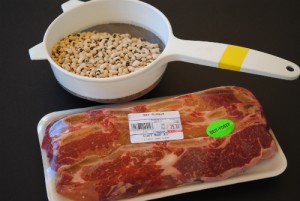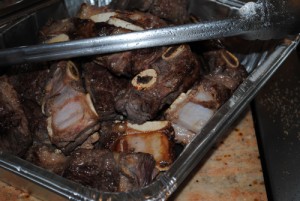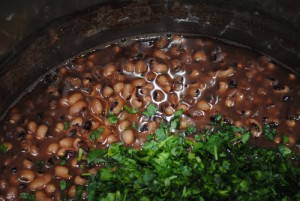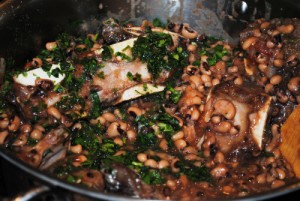This dish is often served as one of starters for the Jewish New Years Dinner. Black eyed peas signify increasing ones merit in life and are used in a Sephardic ceremony using many symbolic foods to ask for blessings at the start of Rosh Hashanah dinner.
This dish is so rich and comforting that it would be great served for a main course dinner on a cold day.
1 16 ounce package of dried black eyed peas.
1 large onion, diced small
4 cloves of fresh garlic, chopped
4 strips of beef short rib meat with bone
2 tablespoon of safflower oil
1 bunch of fresh parsley, washed and chopped
1 14 ounce can of chopped tomatoes
½ cup of Tamarhindi sauce in a jar (available at Persian, Syrian, or Indian markets)
Salt and pepper
1 teaspoon cinnamon
1 tablespoon Baharat seasoning
2/3 cup dried plums, roughly chopped
2/3 cup dried apricots, roughly chopped
Rinse the black eyed peas and check them over for any defects. Set the peas in a bowl of cool water to soak for a couple of hours or overnight. Fill a large stock pot with 3 quarts of water, add peas, and bring to a boil. Turn them down to a simmer and cook for 1 and ½ hours. In the meantime, prepare the other ingredients.
Slice each long piece of short rib into 3 or 4 pieces. Season the meat with salt and pepper. Heat a large Dutch oven, and then add the safflower oil. Swish the oil around to cover the bottom of the pan and then add the short rib pieces. Sear the pieces and remove each piece from the pan once it is gold crusted and set aside on a plate. 
When all of the pieces of short ribs are seared, turn the heat down a bit and add the onions and garlic. Sauté a bit, season with salt and pepper, add the parsley, stir together. Add the cooked beans with their liquid. Season with cinnamon and baharat, pour in tomatoes and tamarhindi. Finally place seared meat along with any juices that have collected on the plate in the mix. Lastly add the dried plums and apricots. Cover beans with a tight fitting heavy lid. When the beans come to a boil, turn down the heat, and let it cook on low heat for about three hours. The dish should be well blended and very fragrant. The meat falls off the bones when it is ready and the beans are very tender. The entire individual ingredients meld together to create a wonderful taste. Serve as a main course stew, or an appetizer portion or side dish.








Leave a Reply